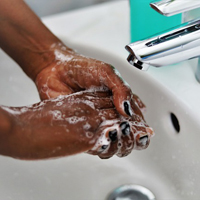Reported healthcare workers knowledge and practices of hand hygiene in specialist hospitals of Kano, Northwest Nigeria

All claims expressed in this article are solely those of the authors and do not necessarily represent those of their affiliated organizations, or those of the publisher, the editors and the reviewers. Any product that may be evaluated in this article or claim that may be made by its manufacturer is not guaranteed or endorsed by the publisher.
Accepted: 21 December 2020
Authors
Compliance with recommended hand hygiene among healthcare providers is important in the prevention of morbidity and mortality associated with hospitalacquired infections including drug resistant microorganisms. This study aimed to determine the reported knowledge and hand hygiene practices among healthcare workers in Specialist Hospitals in Kano, Nigeria. Descriptive cross-sectional study design was used to study 302 healthcare workers in the specialist hospitals in Kano. Data was collected using semi-structured self-administered questionnaire and analyzed at univariate, bivariate and multivariate levels using IBM SPSS version 22. The age of the respondents ranged from 18 to 59 years with a mean of 31.4±9 years. Up to onethird (36.1%) of the respondents had poor knowledge despite the reported hand hygiene practice of 78%. Use of Alcohol Based Hand Rub and soap and water constituted 26.7% and 15.7% respectively. There was statistically significant association between working in MMSH, working in Pediatrics wards, CHEW cadre, and attendance of hand hygiene training in the last 3 years and having good knowledge of hand hygiene. Hand hygiene training was found to improve hand hygiene knowledge [AOR=1.58, 95% CI= (1.01-2.5)] and practice [AOR=1.12 95%CI= (0.64-1.99)]. Reported knowledge of hand hygiene was poor but the practices were encouraging and associated with formal training of healthcare workers on hand hygiene. Therefore, Hospital management should ensure regular hand hygiene training and re-training among healthcare workers.






